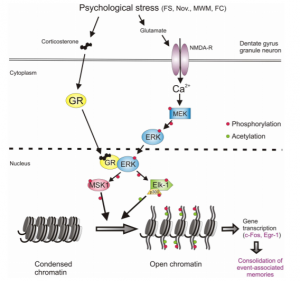In the world we live in today, stress is all around us. In the past, the stress response from our brains was important in aiding to our survival from danger, but with few threats to our lives in modern times, the stress response often goes too far for situations that don’t call for it. It can cause people to lose focus on tasks, have wandering thoughts, and feel excessively anxious for situations that don’t call for it. All these effects are felt due to memories forming exceptionally intensely during a stressful moment or period in one’s life.
How do these memories form?

A couple things occur when an individual is affected by a stressor:
- Glucocortiocoids, like cortisol, are hormones released during the stress response. They will bind to and activate glucocorticoid receptors (GR) in the brain (hippocampus and amygdala). Activation of GRs can lead to enduring or permanent changes in the genetic code for the forming of long-term memories. In mild to moderately stressful situations, memories help to prevent an action from occurring again. However, a person feeling extreme stress can actually experience memory loss.
- The NMDAR / ERK1/2 / MSK1-Elk-1 pathway is activated. This process is just a sequence of enzymes becoming phosphorylated in response to glutamate binding to the NMDA receptor, as seen in the figure above. The stress will cause one’s body to release glutamate, an excitatory molecule, which will then bind to NMDA receptors. When activated, NMDA will allow the movement of calcium into a neuron. Calcium ions will then go on to activate the enzyme MEK, which will in turn phosphorylate the enzyme ERK.
From there, activated ERK and activated GRs will interact to phosphorylate two other enzymes, MSK1 and Elk-1 (then phosphorylates p300). These two enzymes together will change the way genes are expressed in neurons and altogether in the genome. Chromatin of the DNA will then be affected by MSK1 and Elk-1 through phosphorylations and acetylations of regions of DNA. These changes will affect expression of genes in your DNA, allowing normally silent genes to be expressed, namely c-Fos, and Egr-1. These genes are important for forming stronger memories, which explains why you might remember stressful or embarrassing moments more often or in greater detail.
We Have Silent Genes?

Yes, there are actually regions in our DNA code that are “silenced” and not expressed. The proteins these genes code for are not made, that is unless there is some sort of modification to the DNA or transcription factors. In the stress-filled situations discussed previously, the genes being changed from silent to expressed are c-Fos and Egr-1, examples of intermediate early genes (IEGs). IEGs are different from your average gene in that they are considerably shorter in sequence (19 kilobases compared to the average 58 kilobases). Not only can their expression be changed, but they can be activated and transcribed within minutes. Just as some genes are silent and changed to be expressed, expressed genes can be silenced and transcribed or translated.
With our increasingly busy lives comes added stress. There are times and places for stress, but it is becoming more common in parts of our lives where it is completely unnecessary and is detrimental to well-being. It is more important now for those dealing with stress, anxiety, or PTSD to look for professional help or hobbies that will help them decompress and relax. Both strategies have shown to be a great help in dealing with symptoms and handling future stressors in a healthier fashion.
